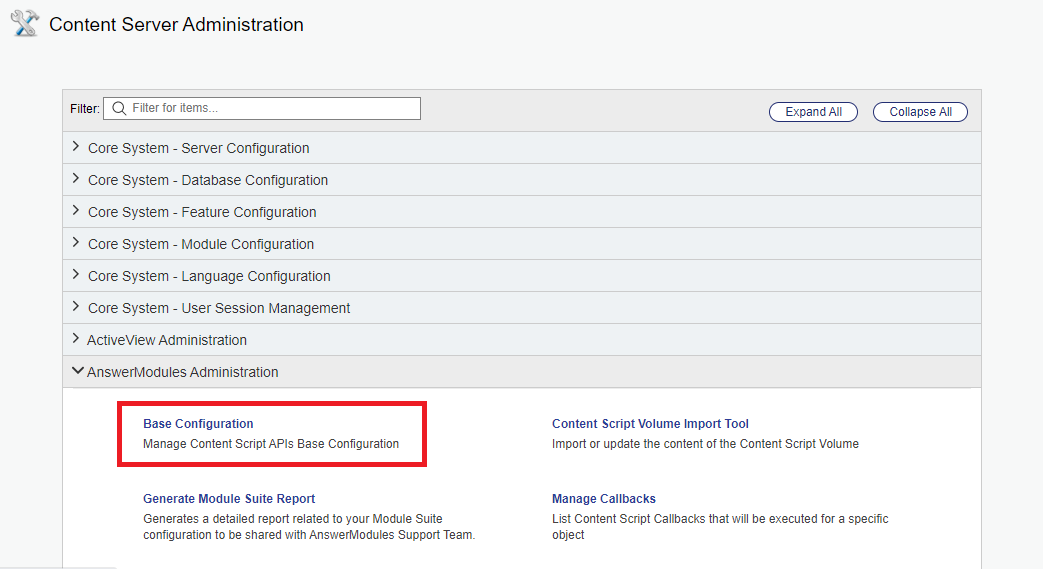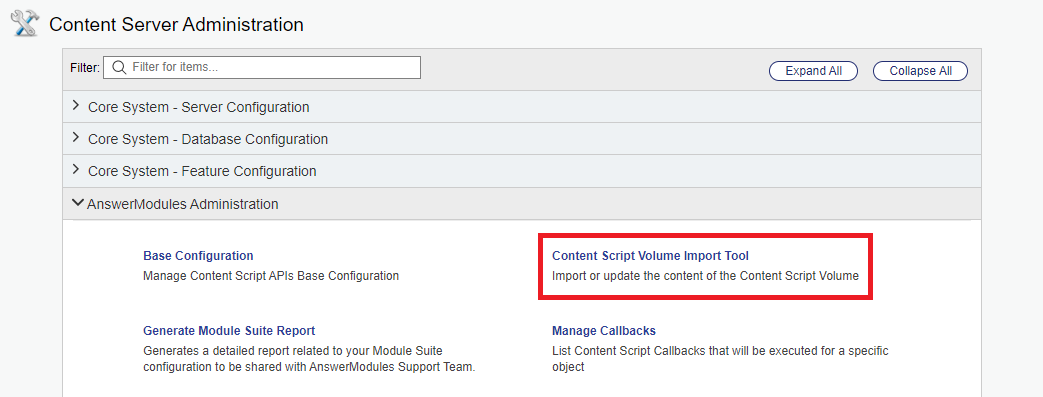Introduction¶
In a production environment, certain conditions are often present that facilitate performance optimizations. Unlike in development or testing environments, configurations in production are expected to remain stable, with infrequent changes. Additionally, the components of a distributed application are less likely to undergo modifications. Leveraging these stable conditions, it is advisable to activate caching mechanisms specifically designed to enhance performance.
This guide provides a comprehensive checklist of configurations recommended for review and adjustment in a production setting. Implementing these configurations can significantly optimize performance and enhance the user experience.
Base Configuration¶
The Base Configuration encompasses all parameters that the Module Suite utilizes for its core functionality, as well as for all installed extension packages. To access the basic configuration page, navigate to the Content Server's administrative interface and select the Base Configuration link within the AnswerModules administration settings.

Configuration Parameters¶
The parameters available for configuration fall into two primary categories:
-
Performance Optimization Parameters: These parameters are specifically designed to enhance system performance in production environments. By adjusting these settings, you can ensure efficient operation and optimized resource use.
-
Usage-Based Tuning Parameters: These settings allow for the fine-tuning of the Module Suite to align with the actual usage patterns of the tool. Given the diverse range of use cases for the Module Suite, it is understandable that not all parameters will be relevant to every implementation.
Below is a list of the parameters, beginning with those that have the most significant impact on performance. For each parameter, we provide the recommended baseline value or possible alternatives, accompanied by a brief explanation of their purpose.
Performance Optimization Parameters Table¶
The following table outlines key configuration parameters, their recommended baseline values or alternatives, and a brief description of each parameter's purpose.
| Parameter Name | Recommended Value | Alternatives | Description |
|---|---|---|---|
amcs.amsui.volumeCache |
true |
false |
Enables the caching of the portion of the Content Script Volume related to enhancements to be applied to the Smart View. |
amcs.amsui.volumeCache.ttl |
3600 |
NA | The duration of the entries in the cache above in seconds (must not exceed 30 days). |
amcs.cache.connectionString.default |
A space separated list of hostname and port pairs, e.g., myserver:8512 myserver:8513. |
NA | Module Suite uses memcache for implementing caching at various levels; it is essential this configuration contains accurate values. |
Enable/Disable Module Suite internal cache |
unchecked |
NA | Allows Module Suite to cache the Content Script Volume and other objects. |
Enables the Beautiful Webforms View Template Cache |
checked |
NA | Caches the information related to the skin associated to each form view. |
Store Static Variables in memory |
checked |
NA | Caches the information related to the Script static variables. |
amcs.core.callbacksUserIDs |
1000 |
empty |
A comma-separated list of user IDs for whom it is possible not to track sync events. |
Please ensure these values are accurately reflected in your Module Suite configuration to optimize performance and functionality.
Usage-Based Tuning Parameters Table¶
The following table provides detailed information on key usage-based tuning parameters, including recommended settings, alternatives, and descriptions to guide adjustments based on specific usage scenarios.
| Parameter Name | Recommended Value | Alternatives | Description |
|---|---|---|---|
Enable/Disable Asynch events management |
checked |
NA | This checkbox disables the feature that tracks events on the Content Server and populates the queue for the Asynchronous Job handler to process them later. Inspect the content of the CSEvents folder in the Content Script Volume to determine usage. If no Content Scripts are found, the feature is not used and can be safely disabled. |
List Nodes API for complex and convoluted ACLs |
unchecked |
checked |
This setting should be considered if working in an environment with many nested groups and experiencing problems listing content in spaces or folders due to complex and convoluted ACLs. |
xECM for Everything |
unchecked |
NA | Enable this feature only if you have deployed a Module Suite SPI adapter leveraging the xECM for Everything functionality. |
amcs.core.callbackSynchEventsEnabled |
false |
true |
This property enables the feature that tracks events on Content Server and triggers the execution of configured Content Scripts. Inspect the content of the CSSynchEvents folder in the Content Script Volume to determine usage. If no Content Scripts are found, the feature is not used and can be safely disabled. |
Please adjust these settings based on the actual usage patterns and requirements of your Module Suite implementation.
Content Script Volume¶
The Content Script Volume plays a crucial role in the performance of productive environments. Specifically, before version 3.6 of our software, failing to import the portion of the volume dedicated to enhancements for the SmartView could lead to unnecessary database queries by the Module Suite. This inefficiency can be effectively addressed by ensuring the SmartView-related content of the Content Script Volume is fully imported.
Importing SmartView Enhancements¶
To import the necessary enhancements for SmartView, utilize the Content Script Import Tool.

Through this tool, you can achieve a complete setup by following these steps:
- Navigate to the "SmartView" section within the Content Script Import Tool.
- Click the import button to begin the process.

For detailed instructions and more information, visit the Content Script Import Tool documentation.
By following these steps, you can enhance your system's performance by eliminating redundant database queries related to SmartView.